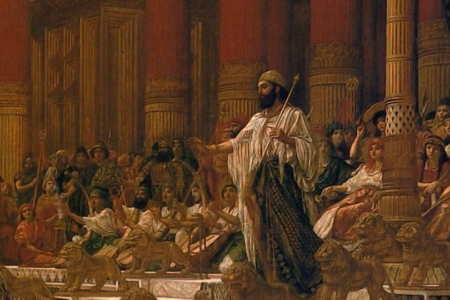The Beginning of the End
God is not to be trifled with. He warned Israel’s kings not to worship other gods, and He meant it. Because He knows the end from the beginning (Isa. 46:10), He knew King Solomon would forsake Him; and He raised up three adversaries during Solomon’s reign who would lead to division in the Israelite kingdom.
The first was Hadad, son of an Edomite king (1 Ki. 11:14–22). When Hadad was a child, King David’s army under his commander Joab conquered Edom. Hadad escaped death by fleeing to Egypt. After hearing David and Joab had died, he returned to Edom. There he plotted against Solomon and caused him much trouble.
The second was Rezon, a Syrian (vv. 23–25). Rezon fled when David attacked Hadadezer of Zobah in the north (2 Sam. 8:3). Rezon “gathered men to him and became captain over a band of raiders” (1 Ki. 11:24). Eventually, he ruled over Damascus and Syria and became Solomon’s adversary, along with Hadad, all the days of Solomon’s reign.
The third and most notable was Jeroboam the Ephraimite (vv. 26–40). A talented, energic young man, he was hand-picked by Solomon to oversee construction of the Millo (a fortress built into Jerusalem’s wall) and other building projects around the city. Ultimately, Jeroboam became an adversary too.
One day, Ahijah the prophet, clothed in a new garment, met Jeroboam outside Jerusalem. Clutching his garment, Ahijah tore it into 12 pieces as a sign to Jeroboam that Solomon’s kingdom would be divided and Jeroboam would rule over the 10 northern tribes of Israel (vv. 29–32).
The reason given was the idolatry Solomon promoted in his kingdom. Hearing that Solomon sought to kill him, Jeroboam fled to Egypt and remained there until Solomon’s death (vv. 33–40).
Throughout his reign, and more so near the end of his life, Solomon sowed seeds that would blossom into rebellion. He imposed burdensome taxes and fostered militaristic control, bureaucracy, racial discrimination, slavery, worldliness, sensuality, and idolatry.
After his death, Israel fell into decay, decline, and division. Solomon’s successor, his son Rehoboam, whose mother was an Ammonite, proved to be an arrogant, frivolous, stupid man who was nonreligious and untrained in God’s Law. Solomon’s seeds of wickedness produced a bumper crop of rebellion against Rehoboam’s reign.
When Jeroboam, along with the congregation of Israel, asked King Rehoboam to ease the grievous burden of compulsory service and oppressive taxation, Rehoboam sought counsel from his ignorant peers and replied, “My father made your yoke heavy, but I will add to your yoke; my father chastised you with whips, but I will chastise you with scourges” (12:14).
Hearing that the king intended to make their burdens even worse than they were under Solomon, the 10 northernmost tribes decided they would have none of it and seceded from the Davidic kingdom (vv. 15–16). Jeroboam, as Ahijah prophesied, became the ruler of the northern kingdom, with Samaria as its capital. Rehoboam was left with Judah and Benjamin, the two southern tribes, with Jerusalem as the capital. After the division, the northern kingdom was called Israel; and the southern kingdom was called Judah.
The division occurred around 930 BC. The northern kingdom lasted until 722 BC, when it was conquered by Assyria. The kingdom of Judah lasted until 586 BC, when it was invaded by the Babylonians. Jerusalem was destroyed; and the people were taken into captivity for 70 years, as prophesied by Jeremiah (Jer. 25:11–14).
The question is often asked, “In his later years, did Solomon turn back to God in repentance?” Solomon did write, “Fear God and keep His commandments, for this is man’s all [the duty of man]. For God will bring every work into judgment, including every secret thing, whether good or evil” (Eccl. 12:13–14).
Knowing Solomon wrote these two verses later in life indicates he might have returned to God before his death. But we’ll never know for sure on this side of heaven.
Solomon’s obituary consists of two brief verses (1 Ki. 11:41– 42). It does not emphasize the grandeur of his life, his legacy, or the sin that ruined his reign. It does mention a book “of the acts of Solomon” (v. 41) that contains more of his writings. But the book is unknown to us today. Solomon reigned over Israel 40 years (ca. 971–931 BC) and was buried in the City of David.








